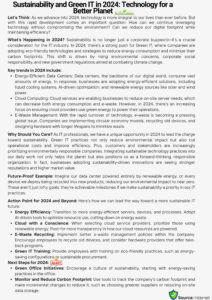E-commerce has become a global phenomenon, with around 57% of internet users engaging in online shopping weekly. In 2023, a third of the world’s population, approximately 2.64 billion people, participated in the online market, contributing to its staggering global worth of US$6.3 trillion. Artificial Intelligence (AI) is transforming the e-commerce landscape, enhancing marketing, transaction processing, and customer support while offering opportunities for personalized experiences and improved logistics sustainability.

AI’s potential in e-commerce extends to customer behavior analysis, personalized advertising, product recommendations, and efficient demand forecasting. It optimizes pricing strategies, transaction processing, and fraud detection, ultimately elevating the overall customer experience. However, challenges arise, including potential market concentration favoring larger enterprises with resources for advanced AI capabilities, concerns about data safety, and the risk of unsatisfactory consumer experiences due to over-reliance on automated assistants.
In parallel, the digitalization of trade, facilitated by the convergence of digitization and the digital transformation of societies, has led to the dematerialization of products and a growing servicification of global trade. Data flows, underpinned by increased processing power, play a crucial role in reshaping traditional cross-border flows and transforming world trade.
The role of platforms, exemplified by giants like Amazon and Alibaba, is central to e-commerce, offering access to global markets but also raising concerns about fair competition and data privacy. Legislation such as the EU’s Digital Services Act (DSA) and Digital Markets Act (DMA) aims to level the playing field between small and large platforms, fostering competition, ensuring transparency, and enhancing consumer protection.
In the dynamic realm of e-commerce, AI not only revolutionizes operational aspects but also plays a pivotal role in predicting market trends and optimizing supply chains. Algorithms delve deep into customer preferences, enabling businesses to tailor advertising and product offerings, fostering an era of personalized online experiences. While AI promises increased profitability through dynamic pricing and fraud prevention, it simultaneously raises concerns about market accessibility for smaller enterprises and potential overreliance on automation for customer interactions.
As the digital trade landscape evolves, the dematerialization of products and the fusion of services with goods redefine global trade dynamics. The dominance of platforms like Amazon and Alibaba, driven by data monetization, triggers ongoing debates about privacy, competition, and the empowerment of micro, small, and medium enterprises (MSMEs). Legislative efforts, exemplified by the EU’s Digital Services Act and Digital Markets Act, aim to strike a balance, ensuring fair competition, transparency, and heightened consumer protection in the ever-expanding digital marketplace.






